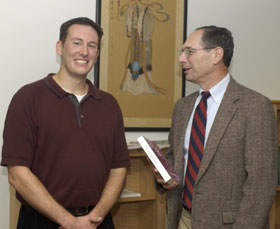|
This is an archived article.
For the latest news, go to the Advance Homepage
For more archives, go to the Advance Archive/Search Page. |
||
|
Student Fellows Find Humanities Institute Mike Vuolo spent 150 hours at a maximum-security prison studying correctional officers and their relationships with prisoners. Mark Beasley-Murray studied hip-hop culture in Cuba and Brazil. Jordan Messier journeyed to the Dominican Republic to conduct research about women there.
These students are among those who have received research fellowships through the University of Connecticut Humanities Institute (UCHI). The fellowships offer both financial and academic support to undergraduate and graduate students. "While the Humanities Institute serves the research interests of UConn faculty primarily, we are also eager to enrich and extend the research projects of the University's best undergraduates," says Richard D. Brown, Board of Trustees Distinguished Professor of History and director of the institute. "Under the supervision of faculty advisors, they have pursued a wide range of research activities in the United States, Europe, and Latin America. We have been impressed by the creativity and professionalism of the students who have sought our fellowships." Vuolo graduated from UConn as an Honors Scholar in May with a major in sociology and political science. He is now at the University of Minnesota-Twin Cities pursuing a Ph.D. in sociology and a law degree simultaneously. Using observation and unstructured interviews, Vuolo studied correctional officers at Cheshire state prison to find out what "sense-making strategies" they used to deal with their jobs. He found the five strategies used most often by the officers were: superiority ("we're better than they are"); easy time ("joke around, keep it light"); humanity ("treat them as you would treat anyone else"); firm, fair, and consistent ("abide strictly by the law"); and begrudging (similar to superiority). He believes his work could help correction departments with their goals. "Some orientations can foster inmate cooperation, and others can cause animosity among inmates and an unsafe environment for corrections staff," he says. Vuolo said the research fellowship helped advance his work: "It helped immensely, covering the cost of transportation from my home to the prison and the cost of thousands of pages of printing." Beasley-Murray, a senior honors student majoring in Latin American Studies and Cultural Theory, headed to Cuba and Brazil to "explore the impact of the black power movement on youth identities and hip-hop music across national discourses on race." He went to Havana for a semester, where he met with and interviewed members of the "local rap scene, the most famous of whom were Assata Shakur and Nehonda Abiodun of the Black Liberation Army." He then traveled to Brazil to study Portuguese and Brazilian history and society, including Brazilian rap. "In addition to contributing to knowledge of hip-hop outside the U.S., my research also sheds light on the impact that the Black Power movement has had in forming youth identities internationall y," he says. The research is part of his University Scholar project. Messier, who is majoring in anthropology and Spanish, spent six months in the Dominican Republic conducting field research for her senior thesis. Her work focused on employed women in Santo Domingo, where she conducted interviews about their perceptions of their gender and economic roles. "Gender roles can't be looked at simply," she says. "It's a complex process involving the whole culture." Timothy Nulty, a graduate student in the philosophy department, is working on his dissertation, examining philosophers Martin Heidegger and Donald Davidson. "Davidson worked within the tradition of analytic philosophy," he says, "while Heidegger engaged in contemporary continental philosophy. Very few professional philosophers engage in research that involves both traditions." Nulty says that as he studied the two philosophers, he began to think they were saying similar things about the nature of truth. "Not only were they making similar claims about truth, but their arguments could be used to supplement weaknesses in each other's theories. I argue that we get a better overall theory of truth if we read Heidegger and Davidson together." Nulty says the UCHI Fellowships "not only provide monetary support for research expenses, but allow freedom from teaching responsibilities so students can focus on their projects." He also enjoys the institute sponsors talks, "where fellows can try out new ideas in an interdisciplinary environment." One of the benefits of the Humanities Institute, he says, is that it "provides a forum in which graduate fellows can continue to hone their skills as scholars." Two residential graduate dissertation fellowships were awarded last year, and two this year. Five undergraduate fellowships were awarded last year. This year's undergraduate fellows have not yet been named. Graduate fellows give an informal presentation about their projects to the residential fellows at the start, and a public presentation in the spring. Dissertation fellows receive the equivalent of a graduate assistantship and are released from any teaching duties. They also receive $1,500 for travel and research, and benefit from interacting with the residential fellows. Undergraduates are eligible for grants of up to $1,000 for "research travel", photocopying, and other expenses. Upon completion of their projects, they present an oral summary of their work to the residential fellows. |

